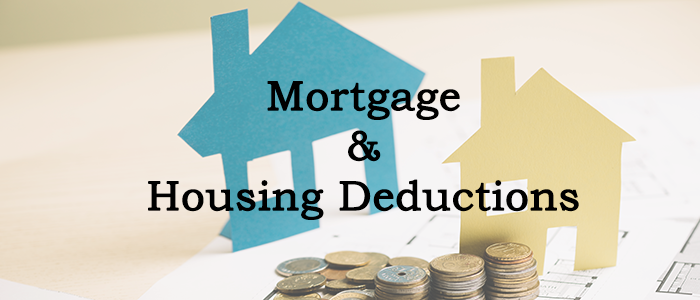
Mortgage & Housing Deductions
Mortgage & Housing Deductions
Mortgage and housing deductions have always been the most criticized and denounced policy of all times if you consider the opinion of economists. The recent tax reforms proposed by the Trump administration have again brought this issue into the limelight. So, we will straight off get into the discussion and try to understand what it is and what it does.
Deductions
In general deductions are those line items in your tax filing, which help you to reduce your tax liability. Individuals who own a house(s) can show the interest paid on their house mortgage as deductions and thus reduce the amount of taxes that they are supposed to pay. A lot of countries do not allow individuals to claim the interest on personal loans and thus mortgage interest deduction became more prominent. Though there are provisions of deductions, one must fulfill some criteria before being able to do so.
Eligibility
It is very important to itemize all the deductions that you want to be part of your tax filing process. Once it is done, you need to ensure that the itemized amount is more than the standard deductions, otherwise the benefits will not come into effect. The deduction is limited only to the interest paid on the mortgage and not the principal amount for the same. There is also a cap on the amount of money used as debt for the house.
The interest paid on the debt of the first million or $500,000 if you are filing separately is considered for the program. When it comes to home equity debt, the IRS considers only the first $100,000.
In order to invite or make it easier for more and more people to purchase houses, the tax code was reformed. Earlier, the tax code would allow interest paid for a personal loan to be exempted or called in as deductions, credit card debt also qualified for the same. It was later modified to remove personal loans and add interest incurred on home loans to be added as deductions. Given the time at which the modifications were done, the idea of having more people purchase houses just doesn’t fit. Simply because, back in 1913 people preferred buying houses with money up front than taking loans.
Changes to the tax code
The current government recently has proposed changes to the tax code when it comes to interest for mortgage and housing deductions. And a lot of experts in the real estate sector strongly believe that any modifications to the real estate sectors in that regards will shake things up. Many believe that the sector hasn’t completely recovered from the bubble that burst back in the year 2006. There have been several studies which suggest that allowing deduction of mortgage has not resulted in a direct increment in ownership of houses. In fact, it has resulted in an increase of property prices to a much larger extent, which again the real estate sector benefits from.
The availability of the tax cuts ensures that house buyers pay the effectively lesser price for their houses than what they had anticipated. This results in them willing to borrow an even higher amount for their houses for completion and addition of other things. This is the point where the loop begins and price associated with the house increase and so does the income opportunities of people that are involved with the business. Expensive houses do not necessarily highlight an economic growth in any form, as the spending is merely relocated. Thus, any changes to the tax code in relation to mortgage and housing deductions is sensitive, to say the least and must be dealt with a lot of care and intense thoughts.

Recent Comments